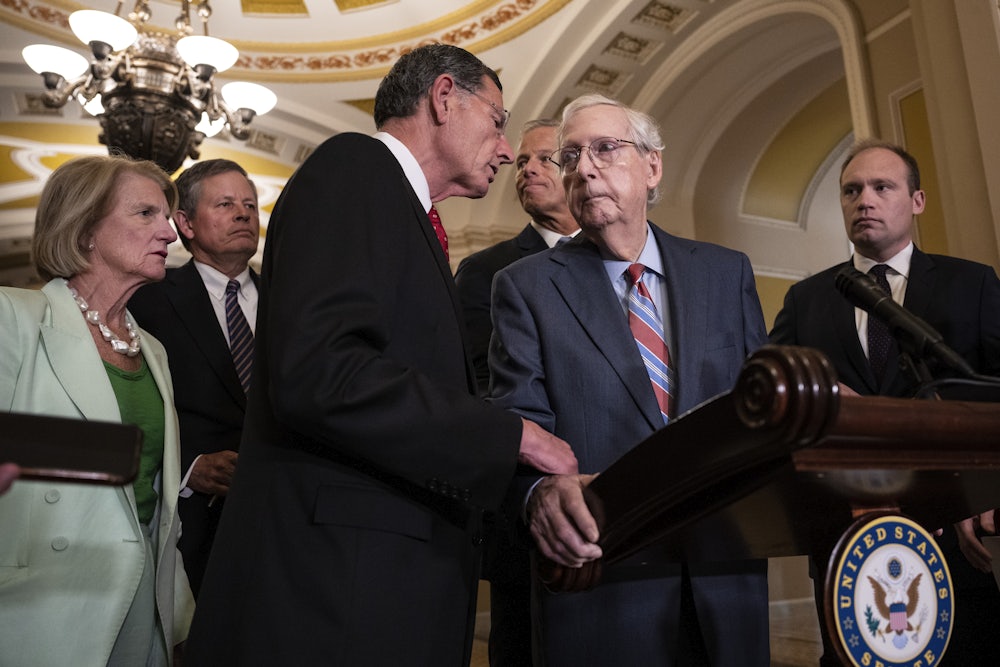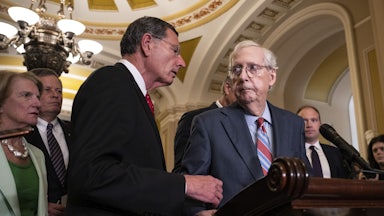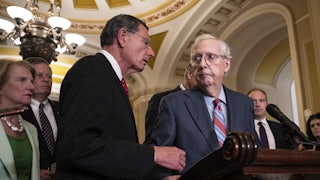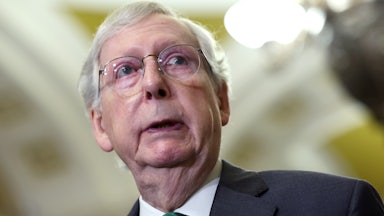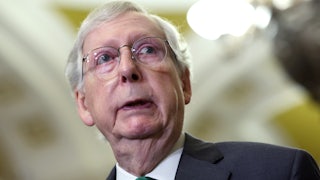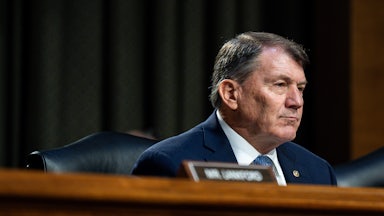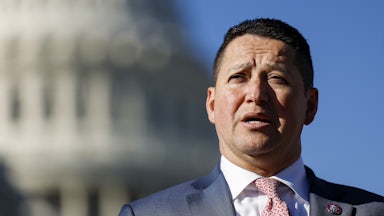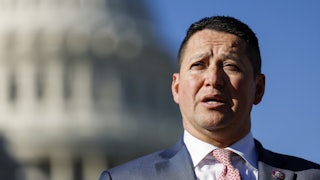Last week, Senator Mitch McConnell, the Republican leader and one of the most powerful politicians of the modern era, didn’t answer a question. In a press conference in Covington, Kentucky, McConnell froze after a reporter asked if he was running for reelection. He stood still and silent for around 30 seconds, unresponsive to the quiet prompting of an aide.
Staffers later said that McConnell, who had a concussion after falling in March, was merely light-headed, and the attending physician to Congress cleared him for duty as the Senate returned this week. “There is no evidence that you have a seizure disorder or that you experienced a stroke, TIA or movement disorder such as Parkinson’s disease,” Brian Monahan, the attending physician, said in a letter to McConnell on Tuesday, adding that “there are no changes recommended in treatment protocols” for his recovery from the March concussion. McConnell was back at the Capitol on Tuesday, with his only acknowledgment of the event a wry comment that “one particular moment from my time back home received its fair share of attention in the press.”
This was the second such incident for McConnell, and an uncomfortable reminder of a similar episode at a press conference at the Capitol in July. He is hardly the only senator contending with major health issues: Democratic Senator Dianne Feinstein, now 90, has faced pressure to resign in the wake of her demonstrable physical and mental decline.
Despite these challenges—to say nothing of the stakes involved as the Senate contends with an overwhelming host of priorities this fall—neither McConnell nor Feinstein has faced public pressure from their Senate colleagues to retire. On Sunday, GOP Senator Mike Rounds told CNN that “on the Republican side, we all understand that [McConnell is] good, he’s good for our party.”
But it’s not only Republicans who have expressed support for McConnell; Senator Bernie Sanders told reporters last week that he “certainly wish[ed] him the best” and a “full recovery.” In a speech on the Senate floor on Tuesday, Senator Dick Durbin, the majority whip, said that he was “happy” McConnell had returned.
“I told him that it was great to see him back and I couldn’t wait to disagree with him,” Durbin joked.
These recent incidents illuminate one of the defining characteristics of the Senate as an institution: the respect and support senators show for each other, even in the midst of daunting health challenges. Privately, some senators have raised concerns about what the future holds for McConnell and for Feinstein. But even as they may whisper behind closed doors, senators have a history of publicly supporting their ailing colleagues—and a traditional deference to the right of an individual senator to choose the path their career takes as it winds down.
“In an era of polarized, divided parties and strong partisanship, I think sometimes those partisan dynamics can lead us to pay less attention to the individualistic nature of the Senate,” said Molly Reynolds, a senior fellow in governance studies at the Brookings Institute. Historically, senators have “displayed a very high degree of comity towards one another,” Reynolds said. The institution still rests on twin pillars of respect for the individual rights of senators and the strength of political alliances.
There may also be a general understanding among senators that any one of them could soon be in ill health. Although the Senate has an aging population, a few of its younger members have also experienced recent health scares: Senators Chris Van Hollen, Ben Ray Luján, and John Fetterman—then a candidate—each had strokes in 2022. Fetterman was hospitalized for several weeks this spring for treatment for depression, an experience that was largely met with sympathy from his Senate colleagues.
The Senate as an institution has long protected itself, and that is evident in the ties between lawmakers. But the upper chamber also has a unique culture of independence; individual senators have significant power, for instance in the capability to block unanimous consent to consider a measure.
That deference to the individual, however, may also be a sign of the “old boys’ club” culture of the Senate, rooted in inertia. One current staffer recalled attending a hearing chaired by former Senator Thad Cochran, who retired in 2018 due to mental and physical decline and died shortly thereafter. An aide knelt next to Cochran, telling the senator “word for word everything he needed to say.”
“There were 30 other senators looking around seeing this happening, like I was, and to me it was like, ‘Oh my God, if Americans saw this, they would be outraged,’” the staffer said. “I think it was so baked into the culture of the Senate that once you’re there, you’re in the club, and we protect you.”
This staffer took a more cynical view of senators’ defense of elderly, ailing colleagues. “It’s 100 percent ego, for all of them. I think they all see themselves in Dianne Feinstein and Mitch McConnell,” the staffer said. “They all see themselves [in the Senate] for the rest of their lives, into convalescence, and they want to defend their right to do that, if and when that time comes for them.”
The gerontocratic lean of the Senate is well known. The Senate’s average age is 64, and the current Congress is one of the oldest in history. Nearly three dozen senators are aged 70 and older; at 81, McConnell is currently the fourth-oldest senator serving. A few members of the House have pointed to the age of certain senators and their recent health challenges as cause for implementing term limits.
Representative Dean Phillips, a Democrat, said last week in a post on X that “the family, friends, and staff of Senators Feinstein and McConnell are doing them and our country a tremendous disservice.” Phillips had previously joined Representative Ro Khanna, another Democrat, in calling on Feinstein to step down earlier this year. Meanwhile, GOP Representative Marjorie Taylor Greene lumped McConnell and Feinstein with Biden, arguing on Wednesday that none of them are fit to serve.
Some influential voices outside of Congress have also raised alarm bells about the incident with McConnell on Wednesday. A Thursday editorial by the conservative National Review argued that it is time for McConnell “to make the decision to step aside from leadership,” even if he does not leave the Senate altogether. “A leadership transition doesn’t need to happen urgently, but the wheels should be turning,” the editorial said. “Prudence and realism have been hallmarks of [McConnell’s] leadership and now are called for in considering his own future.”
Another Thursday blog post by a former GOP staffer on the Senate Steering Committee highlighted a procedure that allows “five senators to force Republicans to decide whether McConnell should continue to serve as leader.” Former South Carolina Governor Nikki Haley, who is running for president, called the Senate the “most privileged nursing home in the country.” However, the conservative intelligentsia is not united in the idea that he should step down, as exemplified by an editorial published in The Wall Street Journal Sunday, which argued that McConnell should stay in his leadership position.
The concerns reflect the general sentiment among the public that members of Congress are, as a whole, too old—worries that are echoed about Biden’s age. A November Reuters/Ipsos poll found that 61 percent of Americans are somewhat or very concerned that “members of Congress are too old to represent the American population.” An August AP-NORC poll found that 77 percent of Americans believe President Joe Biden is too old to serve effectively for four more years—a belief shared by 69 percent of Democrats, along with 89 percent of Republicans. (Fifty-one percent believe former President Donald Trump, who is 77, is too old to serve effectively for another term.)
Increased political polarization has allowed the Senate, once known as the “cooling saucer” of Congress, to get a bit hotter—making it more like the House, where representatives can be openly antagonistic toward each other. But the ways in which senators react to their colleagues’ health crises highlight the distinctions between the two chambers.
“The differences between the chambers have collapsed over time as partisanship has become stronger, but this is a case where some of the cultural differences between the two chambers are still really persistent,” said Reynolds.
Beyond the “there but for the grace of God go I” sentiment that surfaces whenever one of their own is ailing, the upper chamber is also heavily reliant on relationships, and this group of 100 colleagues is relatively close-knit. Bipartisan legislation would be all but impossible without the genuine sense of collegiality between senators.
“Almost every single major bill that happens happens because of respect, trust, and deeper relationships among the colleagues,” said a former Senate leadership aide. “It’s harder to have an element of trust with your colleagues if you’re publicly criticizing their mental capacity, especially based on their age.”
A senator has 99 colleagues they work with directly, whereas a representative has more than 400, making it far less likely that the House member will develop relationships with every single one of those co-workers. Moreover, there is greater turnover in the House, where members only serve in two-year terms as opposed to a senator’s six years in office.
“I think people don’t really appreciate just how small the Senate is, and how just very close and intertwined all of us—members and staff—are. It’s kind of hard to just be a dick,” the current Democratic staffer said.
However, even the Senate’s famed deference only goes so far in the modern political era. Senator Rand Paul, McConnell’s Republican colleague from Kentucky, said on Tuesday that he did not believe the Capitol physician had produced a “valid diagnosis.” Paul, an ophthalmologist, called McConnell’s behavior “a neurological event.”
Senator Josh Hawley, another Republican, told reporters on Tuesday that he was “concerned.”
“I mean, you can’t say that you’re concerned about Joe Biden, but you’re not concerned about Mitch McConnell,” Hawley said.
